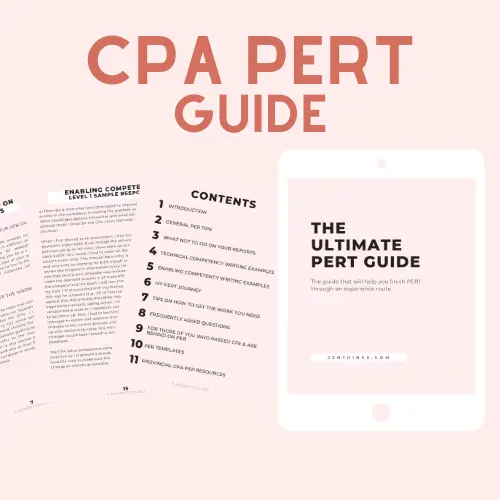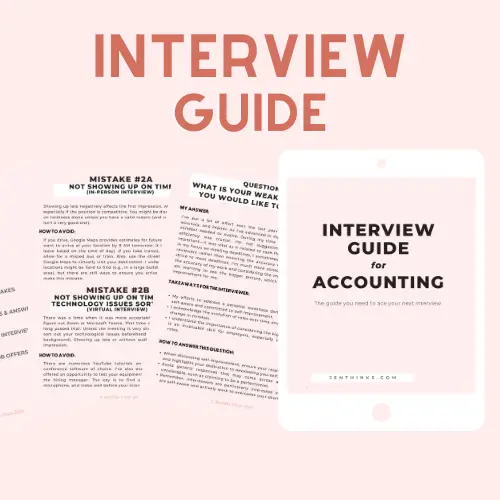I want to start this post by encouraging you to go to the next PERT Q&A session hosted by CPABC. As of now, there is 1 more session taking place in Feb 2021 (register here) but I am sure there will be more to come. I was lucky enough to attend a PERT session also hosted by CPABC at one of my previous workplaces before and found that extremely informative and instructional. Therefore, when I got the email from CPABC, I signed up for the session immediately. The session turned out as informative as the first one and I learned a lot from the questions they answered.
In this post, I am going to share what I learned from the CPA PERT Q&A session I attended. For those who want to watch the whole session, here is the recording for the exact session I went to.
Read all CPA PERT posts here.
Do The Reviewer Comments Matter?
Yes, they matter very much. The reviewers that left those comments are part of the team that will also evaluate your completion CPA review. They are the ones that assess your level based on what you provided in your report. From experience, the comments they provide are generally clear and action-oriented. Note, you can provide a revised answer on your next report. For example, if the reviewer asked for more information for a task you reported under Accounting Policies and Transactions for the reporting period January to June 2020, you can include the missing information (plus more if applicable) on your report for reporting period July to June 2021. I would recommend making a note at the beginning for the reviewer to refer back to the specific report. This way, it makes it easier for the reviewer to know what you are talking about.
How Do I Get To Level 2 for CPA PERT?
I want to start this off by saying I have not gotten any level 2 yet. However, based on what I have learned from others and the Q&A session, the following are key ingredients to a Level 2 response:
- actually fit what the competency is about (e.g., don’t report taxation under management accounting)
- progression from previous report (e.g., started by preparing several simple sections of the financial statement to more complex sections/the entire financial statement)
- responses are structured using The CPA Way
- at least 3 to 4 examples demonstrating your thought processes and also the complexity of the tasks
- explanation on why the work is complex, why was judgement required in the scenario and/or recommendation you made
RELATED POST – CPA PERT – Enabling Competencies Examples
Do The Reviewers Look At Your Past Reports?
Yes, they do. This makes sense as CPA has continually stressed the importance of progression over the 30-month duration. If you start your CPA journey as a Senior Accountant preparing financial statements, you are going to be required to show progression by doing more than just preparing financial statements at the end of the 30 months. This is why the CPA PERT EVR journey might actually be easier if you start from the bottom (e.g., entry-level AR clerk) and work your way up.
It might sound like candidates in mid-level positions are being penalized for starting CPA PEP later in their career, but CPA encourages continual learning and growth. Also, even if you choose not to move up, you can always collaborate within the department for more breadth.
Are you looking for a comprehensive guide for PERT with example Level 1 & 2 full responses, tips, templates and more? Check out my CPA PERT Guides!
Can Reviewer Bump Your Level Down From Level 2 to Level 1 For Your Previous Submission?
Unfortunately, yes. As I have mentioned in the previous question, CPA values progression. Before you submit your next report, it might be beneficial for you to look at your past reports (tip: I save my submissions offline because the format on PERT makes it hard to read) and ask yourself, “have I progressed?” If not, I suggest you think long and hard about a complex task you might have done and had forgotten to report.
~ More CPA PERT Posts ~
Getting Level 0 for My First PERT Report via Experience Verification Route (EVR)
Tips & Another 5 Months Recognized Via EVR For CPA PERT
How I Planned For PERT Via EVR For The Year
Technical Competencies Examples
7 Months Recognized via Experience Verification Route (EVR)
Ultimate Guide on How to Get Your First Experience Report via EVR Approved
What To Do If I Lost My Job?
If you are not currently employed or simply want to take some time off from work, you are entitled to take up to 2 non-active years. The duration of the non-active time will not count towards your CPA PEP completion deadline.
Candidates have 6 years from the time of enrolment to complete the education portion of the PEP program (from Core 1 to CFE) and 7 years to complete the PERT portion of the PEP program. Any non-active years will be excluded from the calculation.
Do I Need To Request For An Assessment If My Job Responsibilities Changed?
No, you do not need to request for an assessment if your job responsibilities change or if you get a promotion within the same role (e.g., from AP Clerk to Senior AP Clerk). You only need to submit a Change of Job Assessment if you get promoted to a new role (e.g., AP clerk to Corporate Accountant) or got a job with a new employer.
RELATED POST – CPA PERT – What To Do When You Change Job Under Experience Verification Route (EVR)
I Specialized In (Insert In Expertise) – Will I Reach Breadth?
Unfortunately, you might not. Candidates are required to reach Level 1 in at least 4 technical competencies and Level 2 in at least another 4. That means even if you reached Level 2 in all of the 4 sub-competencies under Taxation, you still need 4 level 1s in another competency (e.g., Financial Reporting). If this is the case for you, I highly recommend planning your PERT in advance with the support of your manager.
RELATED POST – CPA PERT – How I Planned For PERT Via EVR For The Year
Does My Job Title Matter? Do I Need To Be A Controller To Get Level 2?
No, your job title does not matter. At the Q&A session, the presenter shared a story about a bookkeeper who has achieved all the requirements for PERT via EVR while someone who was a CFO did not. That is because CPA PERT via EVR all comes down to your progression, job responsibilities and utilization of The CPA Way. The last point is particularly important because the reviewers are evaluating based on what was included in your report. You could have done the most complex analysis at work but if you can’t report that thought process with words, the reviewer simply can’t grant you the level you deserve.
What If I Am Starting PERT After I Passed My CFE – Can I Submit An Overdue Report?
First of all, congratulations on passing CFE. I understand many candidates left PERT until after the CFE because the exam took up most of the attention and energies. It is fine because if you are reading this, it means you are ready!
RELATED POST – My CPA Journey – Getting Level 0 for My First PERT Report via Experience Verification Route (EVR)
In your case, CPA actually allows you to submit one big report (or 2 if there is a need to submit a prior experience report) for the full 30 months. However, I personally think that might be too difficult if you have never submitted a PERT report before. My suggestion is to break it down into 2 more manageable chucks so you can receive feedback on your first report before you start your second one.



